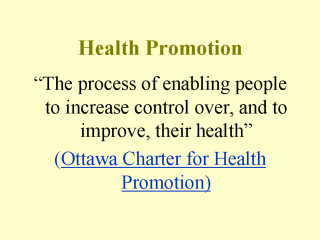-" The
process of enabling people to increase control over and to improve their health” (www.who.int/hpr/archive/docs/ottawa.html).
This tiny definition contains many important elements that help to define what we are
talking about when we talk about health promotion. One of the most important is the idea
of "increasing control”- Another way of describing this is
"empowerment" which many people, including myself, think is the essence of
health promotion. In other words, at the core, health promotion is about empowering
individuals and communities to increase control over the factors that affect their health.
And indeed, there is increasing evidence that greater control is associated with greater
health and vice versa. For example, the so-called Whitehall studies in the United Kingdom
found that position in the civil service hierarchy was directly associated with a number
of health outcomes including death. That is, those at the upper end were less likely to
die prematurely than those at the lower end and the premature death rate decreased with
each step in the hierarchy (Marmot,1986)
- Thus, "increasing control" or "empowerment" appears to be related
to positive health outcomes, and the role of health promotion is to try to increase the
control of individuals or communities, or to "empower them"or help create the
conditions under which people can "empower themselves". So if we are all
together on this, we can move on to the six evidence challenges that I mentioned, the
first one being what do we mean by evidence in the context of health promotion as I have
defined it.
